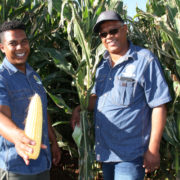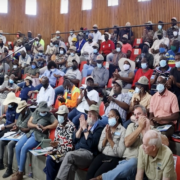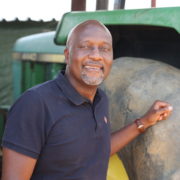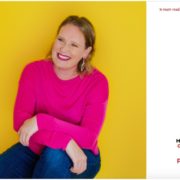Irrigation farmers on the Orange-Riet scheme – African Farming
Keith and Jacqui Middleton have faced some tough challenges in 15 years of farming, but this has not weakened their determination to take their business to the top of the emerging commercial farming sector in the next ten years. The Middletons’ farm, African Joy, is part of the Orange-Riet irrigation scheme near Jacobsdal in the Free State. In the late autumn sun on the stoep of their farmhouse, they shared the story of their farming success with Charné Kemp.
The Middletons came to the 1 200ha farm, with 300ha of scheduled irrigation, as tenants in 2007. As land reform beneficiaries, they have a 30-year lease with an option to buy. Their farm, African Joy, was a land reform acquisition on the Orange-Riet irrigation scheme.
The irrigated hectares are planted to maize, lucerne and 10ha to pecan nut trees. The pecans have expansion potential and Keith and Jacqui are in talks with the Industrial Development Corporation about developing 95ha of pecan orchards. They also run 150 Bonsmara cattle and 300 Merino sheep.
Their greatest limiting factor is access to water as they currently have rights to extract water for only 103 scheduled hectares. Keith describes his early days of farming as difficult but says he learnt, and did, so much.
“I met many farmers and developed a valuable network of contacts,” he says. He has been disappointed in some of his business partners over the years and this has affected his health. There was also some racial prejudice in his community, which he worked hard to overcome.
Today’s problems come in the form of the department not granting farmers title to their land and the difficulties with obtaining the rights to schedule more irrigated hectares.
STEEP LEARNING CURVES
Keith explains his agricultural knowledge was limited in the beginning. “I humbly asked the neighbouring farmers for advice, which they gladly gave. People want to help one another. Farmers introduced me to their networks and let me buy products on their accounts at discounted prices.”
He learned about planting, fertilising, harvesting, marketing, water conservation and animal husbandry. The learning curve for many farmers starting out in the business is steep and Keith and Jacqui were no exception.
“At one stage we lost almost everything. We had no running water or electricity. We were scraping rock bottom to provide our children with the best education possible, so much so that a humble plate of tripe and porridge was a weekly treat,” says Keith.
The Middleton’s son, KJ, was a talented hockey player. This earned him a place at Grey College in Bloemfontein where the then principal played a major role in his development. After school KJ studied commerce at Stellenbosch University.
During the university holiday breaks he went back to the farm to work and to learn the practical side of farming. At one stage Jacqui, a teacher, also went back to university to study sustainable agriculture and rural development.


AN EARLY START IN RURAL LIFE
Jacqui grew up on her parents’ farm in KwaZulu-Natal. Her father bought the farm in 1979 during the apartheid era for R60 000. He had permission from the then Department of Coloured Affairs to own land. They farmed dairy, maize and vegetables, like chilies, cucumbers and potatoes. She studied to become a teacher and met Keith, “a handsome young man”, in Polokwane, Limpopo.
Although she did not know it at the time, her husband was a farmer at heart. Keith worked as a lifesaver at a municipal swimming pool and did renovation jobs after hours. He developed entrepreneurial skills and the spirit to go with them.
After a stint in the USA, the couple returned to South Africa and ended up in Kimberley with their two children, aged 11 (Joy) and 6 (KJ). Keith joined his brother’s IT and stationery business and got involved with the National African Farmers Union (Nafu) as he wanted to learn more about agriculture.
“Being involved in the union and becoming its Northern Cape deputy president was my way of helping black farmers get land,” Keith explains. During this time the couple discussed their own farming dreams and started looking at farms but Keith could not get a loan.
“My then white business partner and I approached the Department of Land Reform to buy the farm but the application was denied as we were accused of being a front company,” says Keith.
Soon after this Keith and Jacqui went back to the department and found the official a lot more accommodating as they explained their plans and dreams.
“The department bought the farm. I took a 60% share in the business, and my ex-business partner took a 40% share.”
WATER – THE ESSENTIAL ELEMENT
Keith, the chairperson of the national water committee of the African Farmers Association of South Africa (Afasa), is working with the Department of Water and Sanitation to have all water-user entitlements reviewed and the remaining water rights allocated equitably to black farmers.
It has been a very wet summer, and some of the roads on their farm can only be reached with 4×4 vehicles. Heavy, continuous rain caused waterlogging in the lands and damaged crops. On the positive side, the rain has flushed the system and improved water quality in the Orange-Riet irrigation scheme.
WORKING THROUGH CHALLENGES
When they arrived, the farm’s infrastructure was dilapidated with derelict workers’ houses, broken dams and pivots that were not working, says Keith. And to make matter worse, the relationship between Keith and his business partner broke down.
It was a difficult time and Keith suffered stress-related health problems. The Middletons felt unsupported by the people in their area. “We had running battles with some farmers, who later became my friends. We now have a mutually beneficial relationship,” he says with a smile.
“As soon as people learn to respect each other, they can work and achieve together.” At first the Middletons felt the commercial farmers did not respect them. But they put in the time and effort to get the recognition they deserved. Keith explains that agricultural ignorance has its origins in the apartheid era
when there was unequal access to education
and opportunities.
“It is time now for the privileged few to plough back as much as they can so that we can all rebuild the country,” he says. The number of successful emerging farmers in the scheme can be counted on one hand, Keith says, but he plans to improve that number.
“Small-scale farming can be a poverty trap. This government needs to develop commercial black farmers by giving them access to land and water so they can compete on an equal footing with commercial farmers. We are about to stage a protest as we feel we are set up to fail.”


CONTINUITY AND STABILITY THROUGH THE SECOND GENERATION
Jacqui and Keith are both proud that their son will be a second-generation emerging farmer. KJ was a boy of three when he told his parents he would one day be a farmer with lots of tractors and cattle. Now, with an honours degree in management accountancy and three years of corporate experience, he is taking the business to the next level.
“Since I got here I have introduced a lot of technology,” KJ says. “Instead of wasting fuel driving to the pivot to switch it on, I do it on my phone. Using this system also saves us 40% on our electricity bill. By being more efficient, we can be more profitable.”
He has also installed security systems to prevent cable theft on the farm. They have invested in precision technology to plant straighter and more accurately, which they hope will increase yields by 20%. Although they have fewer staff members than before, production and productivity have increased.
“My dad and I do the thinking and planning, while the staff are trained and know what is expected of them daily,” says KJ.
“I have developed an app that provides farmers with management tasks, education, resources and practical tips for each stage of sheep and cattle production. I’ve been testing the app and use it to keep track of my daily tasks and to plan weeks ahead.” As a second-generation farmer he has several generations to catch up, unlike his white counterparts who have many generations of agricultural knowledge and experience passed down over the years.
“It will take me a decade or so to catch up.” KJ suggests that government hand over leased farms to successful emerging farmers. “Our 30-year lease is reassuring but does not mean much when it comes to doing real business,” he says. Without title, farmers cannot get decent production loans. Inflation and rising input prices also make flexible production loans critical to success.
“We can’t afford to buy this farm from government as officials have suggested; it is a multimillion-rand asset in which we already have invested a lot,” KJ explains. Farmers without title cannot compete with commercial agricultural businesses nor can they rely on commercial organisations to approve unsecured loans.
The loans they can secure are not enough to increase annual production and accompanying turnover. Where funds are short, they make up deficits by using profits from the previous season. The Middletons think this government policy does not promote profitable, sustainable and self-sufficient farms.
PLANNING FOR THE FUTURE
KJ has ambitions for the farm and aims to market produce directly from the farm to the consumer. “We are in the middle of expanding pecan nut country. We want to develop tourism alongside agriculture. It would be wonderful to have an annual pecan nut festival in which other produce is also marketed, with live music and stalls, accompanied by related tourism ventures in the countryside,” he says.
KJ wants to provide an opportunity for tourists to enjoy farm life, to buy produce directly from the farm, to learn about where their food comes from, to create the necessary space for small local businesses to sell produce at a market, and to increase general traffic to the area.
KJ also believes there is the opportunity to market visits to working farms as educational school tours, something that could benefit society at large. Keith’s plan, from the start, was to be the pioneer and lay the groundwork for the future generation, who would get educated and take the business to the next level.
“My descendants will farm here long after I am gone.”















